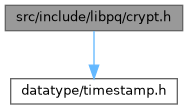#include "datatype/timestamp.h"

Go to the source code of this file.
Macros | |
| #define | MAX_ENCRYPTED_PASSWORD_LEN (512) |
Typedefs | |
| typedef enum PasswordType | PasswordType |
Enumerations | |
| enum | PasswordType { PASSWORD_TYPE_PLAINTEXT = 0 , PASSWORD_TYPE_MD5 , PASSWORD_TYPE_SCRAM_SHA_256 } |
Functions | |
| PasswordType | get_password_type (const char *shadow_pass) |
| char * | encrypt_password (PasswordType target_type, const char *role, const char *password) |
| char * | get_role_password (const char *role, const char **logdetail) |
| int | md5_crypt_verify (const char *role, const char *shadow_pass, const char *client_pass, const uint8 *md5_salt, int md5_salt_len, const char **logdetail) |
| int | plain_crypt_verify (const char *role, const char *shadow_pass, const char *client_pass, const char **logdetail) |
Variables | |
| PGDLLIMPORT int | password_expiration_warning_threshold |
| PGDLLIMPORT bool | md5_password_warnings |
Macro Definition Documentation
◆ MAX_ENCRYPTED_PASSWORD_LEN
Typedef Documentation
◆ PasswordType
Enumeration Type Documentation
◆ PasswordType
| Enumerator | |
|---|---|
| PASSWORD_TYPE_PLAINTEXT | |
| PASSWORD_TYPE_MD5 | |
| PASSWORD_TYPE_SCRAM_SHA_256 | |
Function Documentation
◆ encrypt_password()
|
extern |
Definition at line 180 of file crypt.c.
References Assert, elog, ereport, errcode(), errdetail(), errhint(), errmsg(), ERROR, fb(), get_password_type(), MAX_ENCRYPTED_PASSWORD_LEN, MD5_PASSWD_LEN, md5_password_warnings, palloc(), password, PASSWORD_TYPE_MD5, PASSWORD_TYPE_PLAINTEXT, PASSWORD_TYPE_SCRAM_SHA_256, pg_be_scram_build_secret(), pg_md5_encrypt(), pstrdup(), and WARNING.
Referenced by AlterRole(), and CreateRole().
◆ get_password_type()
|
extern |
Definition at line 153 of file crypt.c.
References fb(), iterations, MD5_PASSWD_CHARSET, MD5_PASSWD_LEN, parse_scram_secret(), PASSWORD_TYPE_MD5, PASSWORD_TYPE_PLAINTEXT, PASSWORD_TYPE_SCRAM_SHA_256, and SCRAM_MAX_KEY_LEN.
Referenced by AlterRole(), CheckPWChallengeAuth(), CreateRole(), encrypt_password(), md5_crypt_verify(), plain_crypt_verify(), RenameRole(), and scram_init().
◆ get_role_password()
Definition at line 43 of file crypt.c.
References _, DatumGetTimestampTz(), days, fb(), GetCurrentTimestamp(), HeapTupleIsValid, MemoryContextSwitchTo(), ngettext, now(), password_expiration_warning_threshold, PointerGetDatum(), psprintf(), pstrdup(), ReleaseSysCache(), SearchSysCache1(), StoreConnectionWarning(), SysCacheGetAttr(), TextDatumGetCString, TimestampDifferenceMicroseconds(), TopMemoryContext, USECS_PER_DAY, USECS_PER_HOUR, USECS_PER_MINUTE, USECS_PER_SEC, and warning().
Referenced by CheckPasswordAuth(), and CheckPWChallengeAuth().
◆ md5_crypt_verify()
|
extern |
Definition at line 265 of file crypt.c.
References _, Assert, fb(), get_password_type(), MD5_PASSWD_LEN, md5_password_warnings, MemoryContextSwitchTo(), PASSWORD_TYPE_MD5, pg_md5_encrypt(), psprintf(), pstrdup(), STATUS_ERROR, STATUS_OK, StoreConnectionWarning(), TopMemoryContext, and warning().
Referenced by CheckMD5Auth().
◆ plain_crypt_verify()
|
extern |
Definition at line 336 of file crypt.c.
References _, fb(), get_password_type(), MD5_PASSWD_LEN, PASSWORD_TYPE_MD5, PASSWORD_TYPE_PLAINTEXT, PASSWORD_TYPE_SCRAM_SHA_256, pg_md5_encrypt(), psprintf(), scram_verify_plain_password(), STATUS_ERROR, and STATUS_OK.
Referenced by AlterRole(), check_password(), CheckPasswordAuth(), and CreateRole().
Variable Documentation
◆ md5_password_warnings
|
extern |
Definition at line 33 of file crypt.c.
Referenced by encrypt_password(), and md5_crypt_verify().
◆ password_expiration_warning_threshold
|
extern |
Definition at line 30 of file crypt.c.
Referenced by get_role_password().